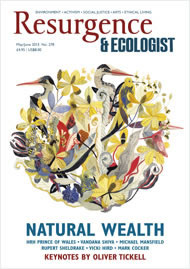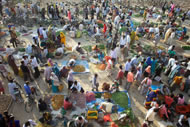While many blame dwindling resources on the world’s growing population, and struggle to find solutions, we at Friends of the Earth have a different perspective. Our focus is on finding ways to manage renewable resources so they aren’t lost to us, or future generations. Key to this is what we do with land and in particular our global food systems.
If you were designing the global food system from scratch, you’d want to ensure that enough food was grown of the right variety in the right way to fulfil 7 billion – and even 9 billion – people’s nutritional needs. By using the right techniques, you could protect the natural systems on which future production depends – soil, water and biodiversity – and you would store surplus food for lean times. You could safeguard good governance of this vital system so that producers, consumers and the planet were fairly treated and were protected from any harmful influence.
But our current system is dysfunctional. Globally around 50% of food grown is wasted in the field or along the food chain – not even composted or used as feed. A third of all the crops grown and two-thirds of fresh water available are used to grow feed for farm animals. These animals are poor feed converters and the meat is sold cheaply, creating even more demand. Millions of hectares are used to produce biofuels for cars, and a large proportion is used to produce sugary foods.
On top of that, vast quantities of energy-intensive fertilisers and pesticides are used to drive yield growth in monoculture systems. Natural methods of fertility and pest control are largely neglected or rejected and grain is used as a tool for global financial transactions, not food. Meanwhile, a billion are underfed, a billion suffer effects of over-nutrition, and many farmers and workers cannot gain a decent living.
The system is broken in many ways, and experts and politicians know it. Models of good practice do exist in how we grow, consume and govern what comes from the land. Many good ideas are being discussed and debated and even practised at the local community level and by governments, so we’re not starting from scratch. It is possible to repair this system if we put our minds and political will into it. But change is not going far, or fast, or deep enough and politicians are running shy of the systemic and governance changes that are now required.
More than 100 UK NGOs and aid agencies recently launched the anti-hunger ‘Enough Food For Everyone IF’ campaign. Their demands are policy-focused – to address the causes of hunger, including land grabs, tax loopholes, and damaging investments in poor countries. What the campaign highlights is the sheer absurdity of the current food system, and why major system change is needed if we are to address poverty and the growing problem of obesity globally.
But where is the environment in the food security debate? What if, in our efforts to feed more people on a limited planet, we trash the soils, water and natural systems we depend on long-term to feed, fuel, clothe and house future inhabitants? This is a mammoth political issue that requires a long-term view, not short-term solutions. Focusing on measures to intensify crop and livestock yields, using techno-fixes such as genetic modification, more artificial fertilisers or mega livestock farms, is not the answer. Clearly technology has a role to play going forward but we’ll need to look at the risks as well as the benefits.
We need to create resilient systems that provide the diverse foods we need in cities and rural areas whilst sustaining the soil and other systems for the future. This will also help resolve significant health issues associated with our broken food system – including hunger, obesity and communicable diseases.
There isn’t a silver bullet, but there are key interventions that will set us on the critical pathway for change. Underlying any changes must be far better governance of the food system, putting the growing corporate control over land and water – to get ever-cheaper raw materials – under greater regulation through national and global policies and ensuring accountability.
We are pursuing key interventions needed on production, consumption and governance to feed ourselves within planetary and social boundaries.
These are our top ten recommendations:
1. Keeping global temperature increases to less than 2°C. Greater temperature increases, which will lead to more extreme weather events, could devastate crop yields in many places.
2. Changing levels of consumption and promoting sustainable diets – critical and significant to reduce greenhouse gases and conserve natural systems.
3. Reducing food waste pre and post harvest, (e.g. through improved food storage and transport systems and better infrastructure) and post consumption.
4. Enhancing yields and increasing resilience to climate change impacts through protecting soils, crop diversification and biodiversity, plus a move towards agroecology.
5. Scrapping mandates for biofuel production from food crops and instead developing efficient vehicles, including electric cars, and enhancing public transport.
6. Increasing nutrient and water resource efficiency.
7. Ensuring low-income access to seeds, land and food, and stopping land grabbing.
8. Shifting trade and other global frameworks to enable and encourage countries to have greater focus on meeting local and regional food needs.
9. Providing agricultural extension services so farmers can access and implement knowledge to enable them to farm more sustainably.
10. Controlling financial speculation on food crops and controlling supermarket and retail buying power where it harms worker, farmer and other suppliers’ abilities to farm sustainably.
Change won’t be easy. Key interventions such as changing diets are poorly understood and perceived as unpopular. But political will is needed to get government, business and individual action on challenging issues such as changing our diets so we eat less meat and eat more of the good green stuff. We’re keen to get your feedback on the challenges ahead and would welcome your thoughts, particularly on sustainable diets.








